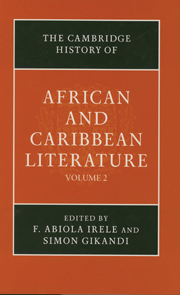Book contents
- Frontmatter
- 23 East African literature in English
- 24 Anglophone literature of Central Africa
- 25 West African literature in English: beginnings to the mid-seventies
- 26 South African literature in English
- 27 African literature in French: sub-Saharan Africa during the colonial period
- 28 North African literature in French
- 29 Francophone literatures of the Indian Ocean
- 30 African literature in Spanish
- 31 African literature in Portuguese
- 32 Popular literature in Africa
- 33 Caribbean literature in French: origins and development
- 34 Caribbean literature in Spanish
- 35 Anglophone Caribbean literature
- 36 The Harlem Renaissance and the Negritude movement
- 37 Postcolonial Caribbean identities
- 38 African literature and post-independence disillusionment
- 39 “Postcolonial” African and Caribbean literature
- 40 Modernism and Postmodernism in African literature
- Index
- References
27 - African literature in French: sub-Saharan Africa during the colonial period
Published online by Cambridge University Press: 28 March 2008
- Frontmatter
- 23 East African literature in English
- 24 Anglophone literature of Central Africa
- 25 West African literature in English: beginnings to the mid-seventies
- 26 South African literature in English
- 27 African literature in French: sub-Saharan Africa during the colonial period
- 28 North African literature in French
- 29 Francophone literatures of the Indian Ocean
- 30 African literature in Spanish
- 31 African literature in Portuguese
- 32 Popular literature in Africa
- 33 Caribbean literature in French: origins and development
- 34 Caribbean literature in Spanish
- 35 Anglophone Caribbean literature
- 36 The Harlem Renaissance and the Negritude movement
- 37 Postcolonial Caribbean identities
- 38 African literature and post-independence disillusionment
- 39 “Postcolonial” African and Caribbean literature
- 40 Modernism and Postmodernism in African literature
- Index
- References
Summary
Francophone African literature is a product of the fait colonial, France’s colonial conquest that brought French schools to her African colonies north and south of the Sahara, educational institutions whose mission civilisatrice (civilizing mission) was to bring French civilization to the “dark continent.” Examining the process of colonization in French Africa, we can trace the earliest beginnings of the civilizing mission to Abbé Grégoire, the former Bishop of Blois who, in 1808, published De la littérature des nègres (On Black African Literature), a text that affirms the ability of the African to master literature, the arts, and science (Blair 1976: 1–3). In his text, Abbé Grégoire comments on the literary talent of Phillis Wheatley, the Senegalese slave sold to a rich Boston merchant, John Wheatley, who educated her. As a result, she became a respected poet of her time. However, Wheatley’s “enlightened” colonial attitude that encouraged the education of his African slave promoted the objective of disseminating European culture to Africans without appreciating African culture in return. The prevailing view throughout the eighteenth, nineteenth, and much of the twentieth centuries was, as Christopher Miller notes, to describe Africa as nothing more or less than a “blank darkness.” In this vein, the critic adds: “The notion of a nullity is a key to understanding European conceptions of Black Africa” (1985: 17).
Beginning in the nineteenth century, Christian missionaries initiated, directed, and staffed many schools in the colonies, but secular schools were established as well. General Faidherbe, whose colonial army had conquered Senegal in the 1860s and 1870s, astutely understood that Muslims would be more apt to send their children to secular schools rather than those directed by Christian missionaries.
- Type
- Chapter
- Information
- The Cambridge History of African and Caribbean Literature , pp. 530 - 551Publisher: Cambridge University PressPrint publication year: 2000
References
- 1
- Cited by



